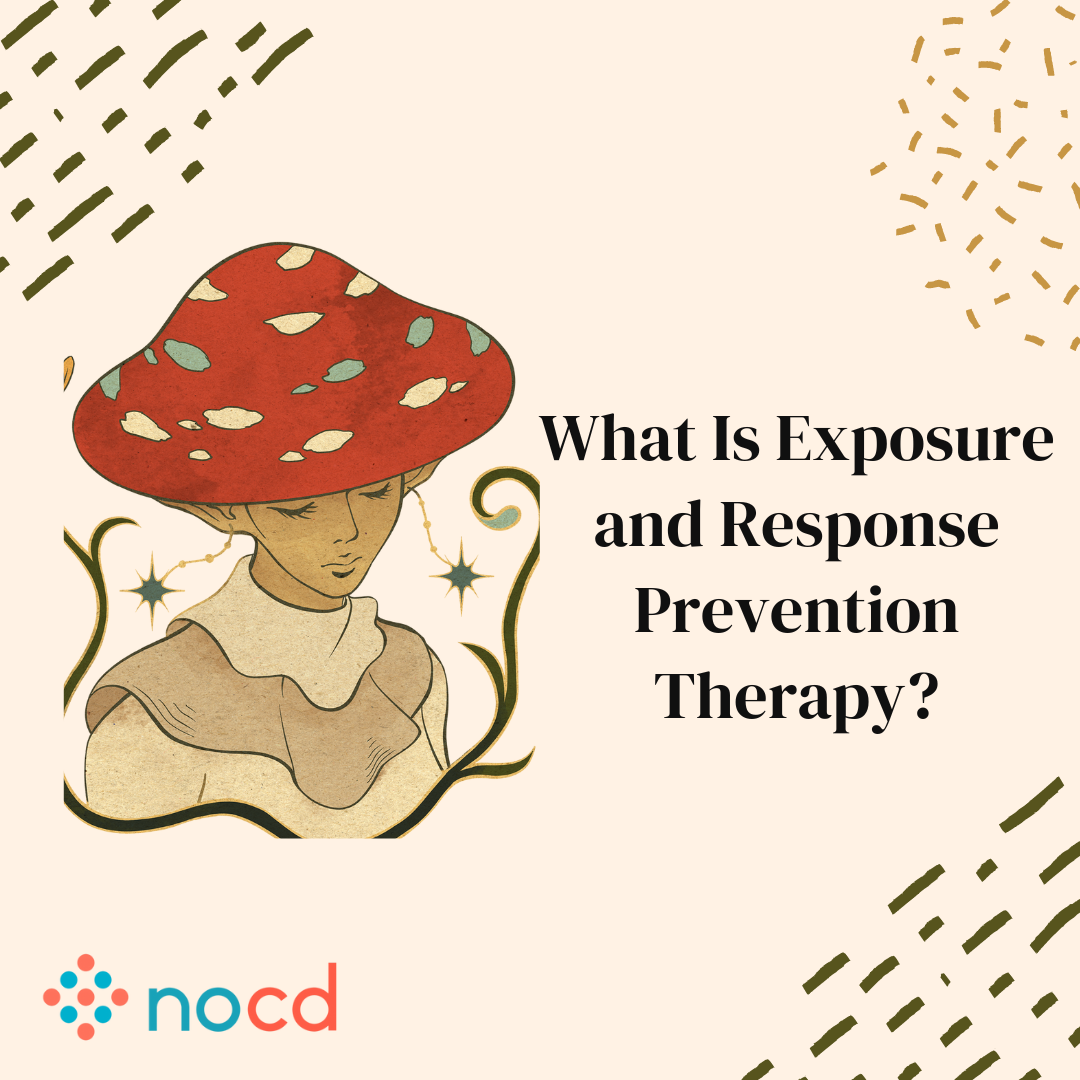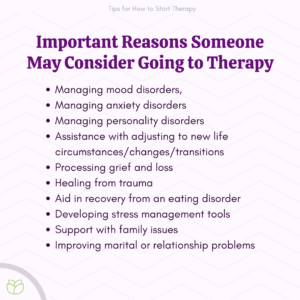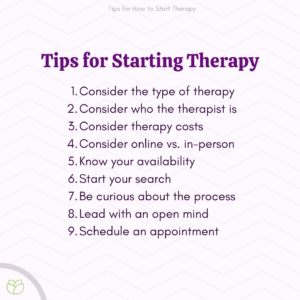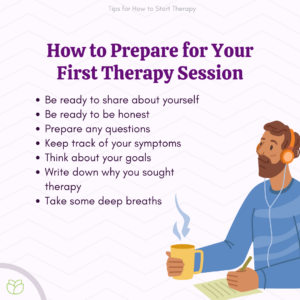The first step to starting therapy is figuring out what type of therapy you need for your specific goals. Things you should consider are the qualities you want in a therapist, the cost, and your availability. Be ready to share your symptoms and concerns. Therapy is a way of taking charge of your life, so be proud of yourself for taking these steps.
Why Is Considering How to Start Therapy Important?
Therapy is a way for people to learn coping skills and progress toward their mental health goals. Studies show that 75% of people experience benefits from therapy.1 Therapy can benefit many mental health conditions across all age groups, genders, and races. Additionally, the beneficial effects of therapy continue even after the individual has stopped seeing their therapist.2
Important reasons an individual may consider going to therapy include:
- Managing mood disorders, such as depression or bipolar disorder
- Managing anxiety disorders, such as generalized anxiety or specific phobias
- Managing personality disorders, such as borderline personality disorder
- Assistance with adjusting to new life circumstances or significant changes/transitions
- Processing grief and loss
- Healing from trauma, such as childhood trauma, sexual trauma, or religious trauma
- Aid in recovery from an eating disorder
- Developing stress management tools
- Support with family issues, such as dysfunctional family dynamics or estrangement
- Improving marital or relationship problems, such as infidelity or a sexless marriage
9 Tips for How to Start Therapy
If you are wondering how to start therapy, begin by locating a therapist who practices the type of therapy you are interested in. Second, find a therapist who fits your financial requirements, whether through insurance or out-of-pocket pricing. Finally, find a therapist who you think you will get along with, and make a list of questions you may have for them when you meet.
Here are nine tips for how to start therapy:
1. Consider the Type of Therapy
There are many different evidence-based therapy approaches, and some may be more effective at treating different disorders. Some therapists practice a single method, while others subscribe to multiple techniques. You can ask a therapist what they utilize when working with clients who have similar concerns, and consider if the approach they take is something you’re willing to try out.
Common types of therapy practiced by clinicians include:
- Cognitive behavioral therapy (CBT): CBT is the most studied behavioral therapeutic approach and focuses on helping individuals recognize how their thoughts could be impacting their behaviors and moods.3 It is often utilized with clients dealing with anxiety, depression, and OCD.4 There are both in-person and online CBT options.
- Eye movement desensitization and reprocessing therapy (EMDR): EMDR is an approach often used to help with trauma by using bilateral stimulation to help create new associations.5 There are both in-person and online EMDR options.
- Dialectical Behavior Therapy (DBT): DBT is very effective in helping individuals diagnosed with borderline personality disorder to learn emotional regulation, mindfulness, distress tolerance, and interpersonal skills.6 There are both in-person and online DBT options.
- Solution-Focused Brief Therapy (SFBT): SFBT is a positive and empowering method that focuses on the client’s strengths, rather than their problems, to help create a solution.7 SFBT is a short-term therapy lasting six to eight sessions.
2. Consider Who the Therapist Is
No two therapists are the same. You could read through the therapist’s bio, or have a quick consult with them before the session to see if they are a good match. Some people can find it comforting to have a therapist who has the same identity as them. Depending on your identity, it may be essential to find an LGBTQ+ affirming therapist, a neurodiversity-affirming therapist, or find a BIPOQ therapist. Take your time to search for a therapist that you think might best align with.
If after a few sessions you’re thinking “I hate my therapist” it may be time to breakup with your therapist and find a new one.
3. Consider Therapy Costs
Unfortunately, therapy can be costly. If you are worried about the cost of treatment, you can begin by asking your health insurance if they cover therapy, if you have any deductible, and if there will be a co-pay. If you do not have mental health insurance, you are considered an “out-of-pocket” payer, which means you are paying for the entire session. If that’s the case, your therapist may ask you to fill out a good faith estimate (GFE), which calculates the average you’ll be paying for the number of sessions they think are fitting. Based on the results of the GFE, you will get a chance to see it and decide if that fits into your budget. You can also ask the therapist if they offer sliding-scale therapy options, which means they are flexible with their rate, or do pro-bono work. You can also search out affordable therapy or even free therapy options in your area and see if any of them are available. Some schools and workplaces will cover a limited number of therapy sessions.
Talkspace - Online Therapy With or Without Insurance Your therapist can help you process thoughts and feelings, understand motivations, and develop coping skills. Covered by most major insurance plans. Try Talkspace
4. Consider Online Vs. In-Person
Online therapy increases the reach of treatment as it can help people from more rural areas or who have more complicated or non-traditional schedules attend therapy more flexibly.8 There are many online therapy options, especially since the pandemic, and many therapists have added the option of telehealth to their practice. On the other hand, some people prefer in-person therapy because it provides a space that is distraction-free and can make a person feel more connected with their therapist. Some therapists offer hybrid options, where you can meet online and in-office. Some individuals need in-person help, and depending on your mental health needs, the therapist may request that you meet in person.
5. Know Your Availability
If you are seeing a therapist remotely, consider where you want to be during your session. Ideally, you want to find a space with no disruptions. Look through your schedules for work, school, family care, chores, or any other responsibilities, and consider where you have time to carve out about an hour for a therapy session. This preparation will help you find a therapist available during those times.
6. Start Your Search
Finding a therapist who is a good fit can be very difficult, and it can be overwhelming to figure out where to start. An online therapist directory is a great place to find a therapist who fulfills your needs. If you have insurance, you can call them and ask for a list of mental health providers in your area and accept your insurance. You could reach out to your physician, family or friends, and ask them whether they know anyone they would recommend.
Top Rated Online Therapy Services BetterHelp – Best Overall “BetterHelp is an online therapy platform that quickly connects you with a licensed counselor or therapist and earned 4 out of 5 stars.” Get 20% off your first month! Visit BetterHelp Talkspace - Best For Insurance Talkspace accepts many insurance plans including Optum, Cigna, and Aetna. Typical co-pay is $30, but often less. Visit Talkspace
7. Be Curious About the Process
If you have things you want to know more about, you can begin to dive into the wealth of information online or get your questions ready for the therapist. For example, you may want to research or ask how to get the most out of therapy sessions. The more knowledge you have, the more your mind may be at ease.
8. Lead With an Open Mind
Depending on your community, there may be a lot of stigma around attending therapy. There are also many misconceptions about psychotherapy due to media and movies, and you may have a wrong idea about how it works. Try to let go of these misconceptions and experience therapy with an open mind.
9. Schedule an Appointment
Here you are! All that’s left is to reach out to the therapist and schedule a consultation. The therapist will ask you to fill out intake forms and sign an informed consent form. If you feel nervous about signing a consent form, ask the therapist about what confidentiality is and the limits to confidentiality.
A good therapeutic relationship hugely impacts the success of therapy. Keep in mind that the first therapist you reach out to may not feel like a good match. Don’t be discouraged; keep searching until you find someone who feels like the perfect fit.
How to Prepare for Your First Therapy Session
Begin preparing for your first therapy session by writing down your symptoms, goals, and any questions you want to discuss. Be ready to be open and honest because the therapist will ask you to share about yourself in detail. Feeling embarrassed or nervous about trying out therapy is normal, so be gentle with yourself.
Ways to prepare for your first therapy session include:
- Be ready to share about yourself: The therapist may ask you about your family history, your childhood, daily routines, and how you cope when things get tough. Be prepared to talk about topics that make you feel vulnerable with a stranger. Also, don’t worry about oversharing. It is the therapist’s job to let you know when it is helpful to be brief and when to go more in-depth.
- Be ready to be honest: Honesty can be challenging because you may be afraid of being judged. However, honesty is important for the therapist to understand what is going on. Remember that the therapist has heard it all and therapy is a judgment-free zone.
- Prepare any questions: You will likely have many questions about the therapeutic process. Think about any questions you might have and pose them to the therapist so you do not have to keep wondering.
- Keep track of your symptoms: The therapist might ask you about specific symptoms you have been experiencing, and on the spot, that can be tough to recall in length. Spend the few weeks before therapy noticing emotions or behaviors that may be important for the therapist to know about.
- Think about your goals: The therapist will ask you what goals you want to reach. This question can be overwhelming at the moment, so take time beforehand to think about what you would like to accomplish with therapy.
- Write down why you sought therapy: Take some time to write out why you are considering therapy and what you want to accomplish. Bring this paper or notes on your phone into the first session so that you have something to reference when the therapist asks you about yourself.
- Take some deep breaths: You are trying something new to help yourself feel better and live a more fulfilling life. Take deep breaths, and let the therapist know if you feel nervous about the first session. You got this!
In My Experience
I have had a lot of patients who walk into my door and are wondering how to start therapy. I always stress to clients that they should remember that therapists are people, just like anyone else. We have trained for many years but are not perfect, so don’t be afraid to let us know if something doesn’t feel right. Also, psychology graduate schools require their students to go to therapy themselves. The therapist you are seeing has been in your shoes at some point and understands what it can be like seeing a therapist for the first time. I wish you an excellent first therapy experience!
To help our readers take the next step in their mental health journey, Choosing Therapy has partnered with leaders in mental health and wellness. Choosing Therapy is compensated for marketing by the companies included below. Online Therapy BetterHelp – Get support and guidance from a licensed therapist. BetterHelp has over 20,000 therapists who provide convenient and affordable online therapy. Take A Free Online Assessment and get matched with the right therapist for you. Free Assessment Online Psychiatry Hims / Hers If you’re living with anxiety or depression, finding the right medication match may make all the difference. Connect with a licensed healthcare provider in just 12 – 48 hours. Explore FDA-approved treatment options and get free shipping, if prescribed. No insurance required. Get Started Medication + Therapy Brightside Health – Together, medication and therapy can help you feel like yourself, faster. Brightside Health treatment plans start at $95 per month. United Healthcare, Anthem, Cigna, and Aetna accepted. Following a free online evaluation and receiving a prescription, you can get FDA approved medications delivered to your door. Free Assessment Starting Therapy Newsletter A free newsletter for those interested in learning about therapy and how to get the most benefits out of therapy. Get helpful tips and the latest information. Sign Up Choosing Therapy Directory You can search for therapists by specialty, experience, insurance, or price, and location. Find a therapist today.Additional Resources
What Is Exposure and Response Prevention Therapy? ERP therapy alters OCD’s pattern by addressing both obsessions and compulsions. In ERP, an individual is encouraged to confront the stimuli that trigger distress related to their obsessions while also resisting the urge to perform compulsions in an attempt to reduce their distress.
Why is ERP So Expensive? There are hundreds of OCD tests and “OCD quizzes” online. Some aim to help people self-diagnose; others turn obsessive-compulsive disorder into a joke. Either way, a vast majority of these are not helpful and probably create more problems than solutions.








